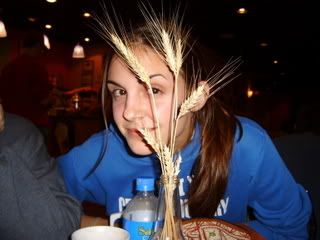I started with a poem of slight substance, an epic idea, but my lines erred with disconnect. Some lines were short, biting with abstract poignancy and others lingered and fell off the page, while the reader and writer alike asked themselves why they were still sifting through the words in their laps when they could be playing softball or swatting flies.
It needed consistency.
So, after throwing the game, I sat down with my eight-year-old hands and counted the syllables in each line on my fingers. I wrote each number next to the line, like a good little soldier with a terrible memory.
Banking on the theories of very dead and very canonized, famous poets and on the quick suggestion of A Poetry Handbook by Mary Oliver, I believed in the consistency of meter.
I kept the meter of the opening two line stanza and modeled the rest of the poem after it. During the course of two hours, I managed to write a better poem. I changed all except the first two lines, some drastically, some ever-so-slightly with the most beautiful of precise words, and really believed I knew what I was doing.
Unfortunately, I never know what I am doing. The first two lines of the poem, the ones I kept, actually do not coincide with true meter. Meter has two syllables for every "foot" of a line. Each line can have any number of feet.
A one foot line is called a monometer.
A two foot line is called a dimeter.
A three foot line is called a trimeter.
A four foot line is called a tetrameter.
A five foot line is called a pentameter; most people have heard of iambic pentameter.
A six foot line is called a hexameter.
A seven foot line is called a heptameter.
An eight foot line is called a octometer.
My lines are footless.
Because every foot has two syllables, each line will have an even number of syllables. My lines have seven and five syllables and therefore, have 3.5 and 2.5 feet, which to my knowledge is called nothing.
Yes, I have footless lines, am not even the equivalent of a slug who has one official foot, according to scientists.
So I failed at meter. I suppose it is a good thing that I have not tried ordering stresses of words in lines or complete forms of poetry like the sonnet, English and Italian, or even more complicated forms like the villanelle. God forbid that I attempt to rhyme anything!
Still, there are some positive attributes to the poem (says the poet). I am quite happy with the enjambment of the poem. Lines 3, 6, and 11 create momentary syntax of ambiguity. The word at the end of one of these lines could have one primary meaning when read with its line, but because the line has to punctuation at its end (it is enjambed), the word at the end of the line could have a secondary meaning when read with the line below it. And I like this, even if they are juvenile primary and secondary meanings.
So all this talk and no poem to dissect. Below is the third draft of this poem and probably not the last. Note that line 12 is not truly five syllables, but I have taken the liberty of smushing the word "memory," which is sometimes pronounced "memry" in the Midwest, and in effect, forced the line to be five syllables. Note also that Blogspot is not letting me design the poem with the correct amount of white space, so the master poem is structurally different.
A Rebirth of Blooms
by Jessica Zephyrs
She embroidered the Blue Ice
the Gray, then the Blush.
Clear curves -- flowers, familiar
shapes of butterflies --
Sensitive, flighty figures
and slow, the smallest
of stitches, an old woman,
a rebirth of blooms.
She embroidered the Pure White,
a ponderous hue
Thread so fine and light it strained
her eyes, her memory.
With the Oyster, the Deep Blue
she sewed simple birds
And pictures on the pillow
fluttered together.
Through the spring of a sparrow
her hands revived thoughts
of fitted dresses -- the strut
that won all the boys.
Well, say what you will. I tried. Maybe, someday, Meter and I will have another go at it, but until then,
A La Destra,
Basalil
